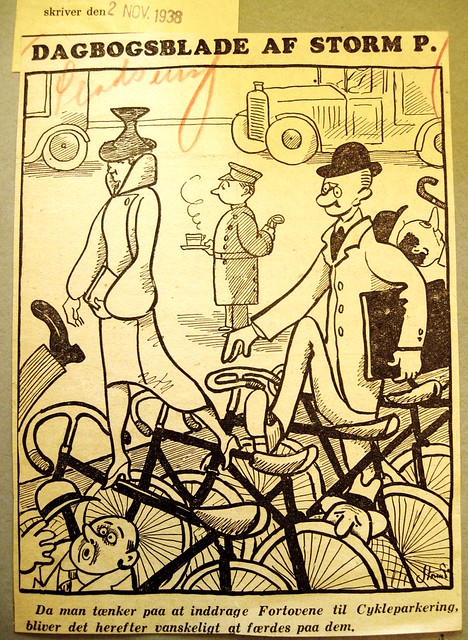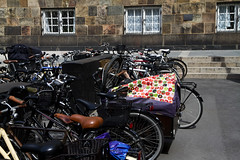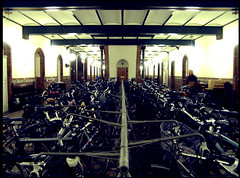
It's no longer the city you may think it is, it seems. The Danish Justice Minister, Morten Bødskov, is the latest antagonist to restrict the growth of Copenhagen's bicycle culture.
He has proposed that Danish municipalities be allowed to remove bicycles parked incorrectly. It is currently only the police who are authorised to do so.
That there are many bicycles parked outside bike racks is certainly a fact and an interesting issue. Look at the cartoon at the top. It's from a legendary Danish satirist, Storm P., who was always keen to highlight the cycling situation, as he was a bicycle user himself. We've translated his pisstake on the anti-cyclist mood in the 1930's previously.
The cartoon reads, "Since they're considering to use sidewalks for bicycle parking, it'll be rather difficult to walk on them."
There were many more bicycles in use in Copenhagen in 1938 than there are now. Parking was an issue then, as it is now. It's basically been an issue since the heady days of Bicycle Culture 1.0.
The point is that many a politician and municipal employee have attempted to solve the issue. Morton Bødskov and the Copenhagen Mayor in charge of Traffic and Environment, Ayfer Baikal - who supports the proposal - are newbies at this game.
They think that merely slamming down the archaeic long arm of the law will fix a problem that has existed for a century. In a city that is allegedly gunning to increase cycling levels.
They couldn't be more wrong.

Their mentality is simplistic and old-fashioned and not fitting of a modern city or nation.
While cycling is, of course, transport, dealing with cycling issues is still done with a traffic engineer mentality. Data, speculation, laws.
Modern, progressive cities discard this last century mentality and look instead to new solutions. Employing the expertise of sociologists and anthropologists to understand the behaviour at work. Using these fields to inspire solutions on the ground.
As I often say, badly-behaved cyclists are usally just cyclists with inadequate infrastructure. Or none at all, as is the case in many emerging bicycle cultures.
Bicycle users in Copenhagen are more often than not neglected with a lack of suitable bicycle parking in high-density locations. Ayfer Baykal - not known as a bicycle user despite her job - should instead be investing in better bicycle parking facilities instead of clapping her hands because Uncle Morton in the Parliament made a decision for her and got her some press.
Bødskov says in the Copenhagen Post, "Unfortunately, a lot of people park their bikes right in front of the entrances to train and metro stations much to the consternation of pedestrians, the elderly and the handicapped,” Bødskov told Berlingske newspaper. “And at the same time the bikes can be a hindrance to rescue operations and cause problems in an emergency.”
Hmm. Can someone tell him about the Bicycle Butlers, please? Assigned to solve this very issue and called a success by Baykal's Traffic Dept?
Like I said, employing orginality and behavioural considerations is the hallmark of progressive cities. And there are numerous minds to employ in Denmark in this field. Understand behaviour and provide better facilities. Follow desire lines and subconscious democracy and adapt accordingly.


Ironically, both Bødker's and Baykal's workplaces - The Danish Parliament (at left) and City Hall (at right) have brilliant bicycle parking facilities - so perhaps it's not surprising they have a hard time understanding the situation for the rest of us.
Even more ironically, the City's own website says THIS about bicycle parking:
Bike Racks
The City places and maintains thousands of bike racks at train stations, in shopping districts and other places where there are many cyclists. It can sometimes be a bit of a squeeze in the many bike racks, but by thinking in new ways we have been able to exploit the possibilities better by, for example, expanding street corners to place bike racks there.
The Danish Cyclists' Federation also called for better facilities - but then agreed to back Bødskov's proposal. So you can understand that Citizen Cyclists feel rather hunted when nobody is around to speak for them.
It's worth mentioning that a part of the proposal was giving the municipality the right to check frame numbers in order to find stolen bicycles, something the City wants to do, but this article is about the main part of the proposal.
It feels like 1952 sometimes in this country, what with the ol' school political mentality and the eagerness to go after bicycle users by doubling fines, proposing helmet laws and, all the while, doing absolutely nothing for lower speed limits or restricting car traffic in this city.
The Car is still King and people like Bødskov and Baykal are the court jesters.

In the same blogpost it's worth mentioning another situation here in Copenhagen. As a rule, the City accommodates for cyclists during roadworks. But ride past Svanemøllen Station and you'll see something unusual. Ole took this photo, above, and explains in the Cykelrazzia FB group:
"What brilliant traffic planning on one of the city's main bicycle arteries - Strandvejen/Østerbrogade. Cyclists heading north have to get off and walk their bike twice within 100 metres. Ridiculousness and pure harrassment of cyclists just so they can build a car tunnel for 1.8 billion kroner. This will surely be a hot spot for police after the summer holidays. Be warned!"
It happened long before the summer holidays. The police were on it like flies on shit, handing out tickets to fill their quotas.
Once again, a case of making things difficult for the cycling citizens - who contribute 1.7 billion kroner in public health benefits to the City each year - and then punishing them.
It's like your landlord sticking chewing gum in your lock and then making you pay for a locksmith.
Welcome to the new Copenhagen.